Key takeaways:
- Nightclub music venues foster creativity and community, significantly impacting audience experiences through their atmosphere and layout.
- Networking in the music industry is crucial for growth, connecting with others can lead to unexpected opportunities and meaningful relationships.
- Building genuine connections requires authenticity, vulnerability, and ongoing engagement through follow-ups and social interactions.
- Utilizing social media effectively can enhance networking efforts, creating lasting connections and fostering collaboration beyond live events.
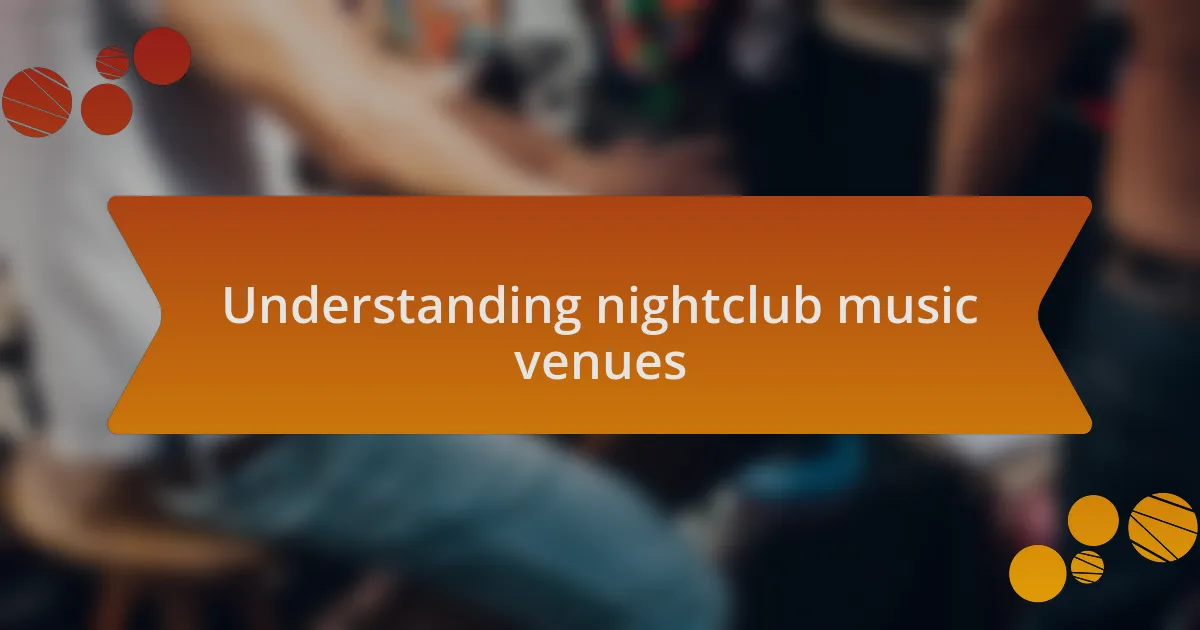
Understanding nightclub music venues
Nightclub music venues are more than just places to dance; they are vibrant ecosystems where creativity flourishes. I remember my first experience in a small, dimly-lit club, surrounded by pulsating lights and the thumping bass of live music. The atmosphere was electric, drawing me in and connecting me with fellow music lovers in a way that felt almost primal—what is it about music that brings us together so profoundly?
These venues vary widely in size, ambiance, and genre, catering to diverse tastes and crowds. Some might feature intimate settings with local artists showcasing their talent, while others boast well-known DJs that transform the space into a high-energy dancefloor. Have you ever noticed how the right venue can change your entire experience of a performance? I certainly have; there’s a unique charm in discovering an unknown artist in a cozy nightclub that a big arena concert just can’t replicate.
The architectural layout of a nightclub also plays a vital role in shaping the experience. The layout can either promote a sense of community or create an atmosphere of separation. I once attended a venue where the stage was elevated, allowing the entire crowd to feel united as we swayed to the music. It made me wonder—how important is the physical space in facilitating our emotional connections to the music, and to each other?
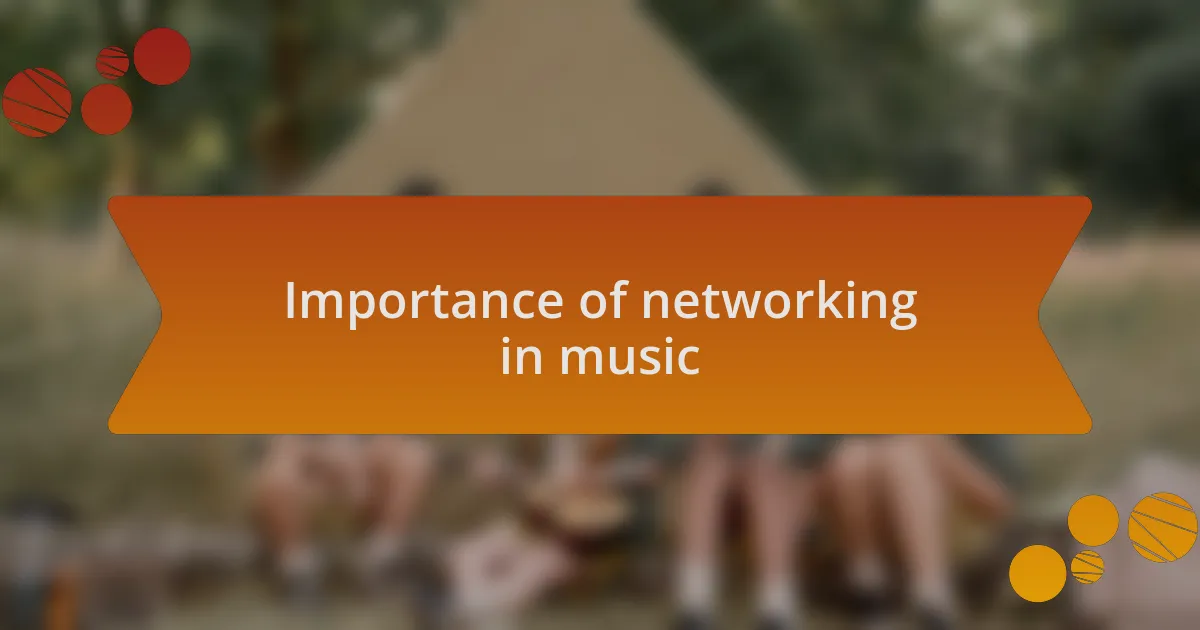
Importance of networking in music
Networking in the music industry is essential for anyone looking to make their mark. I once attended a local gig where I struck up a conversation with an aspiring DJ, and that casual chat led to a collaborative project that significantly boosted both our profiles. It reinforced my belief that connections can often lead to unexpected opportunities and growth.
Building relationships at music events can significantly shape your career path. I recall meeting a promoter at a small club who later invited me to assist with organizing events—an experience that honed my skills and expanded my network. Have you ever thought about how a single interaction could alter your trajectory in the industry?
Moreover, networking isn’t just about professional gain; it’s also about fostering a shared passion for music. At a vibrant showcase, I met someone who shared my love for a specific genre. That moment created a bond that went beyond business, highlighting how meaningful relationships often develop in these buzzing atmospheres. Isn’t it fascinating how music has the power to unite people over shared dreams and aspirations?
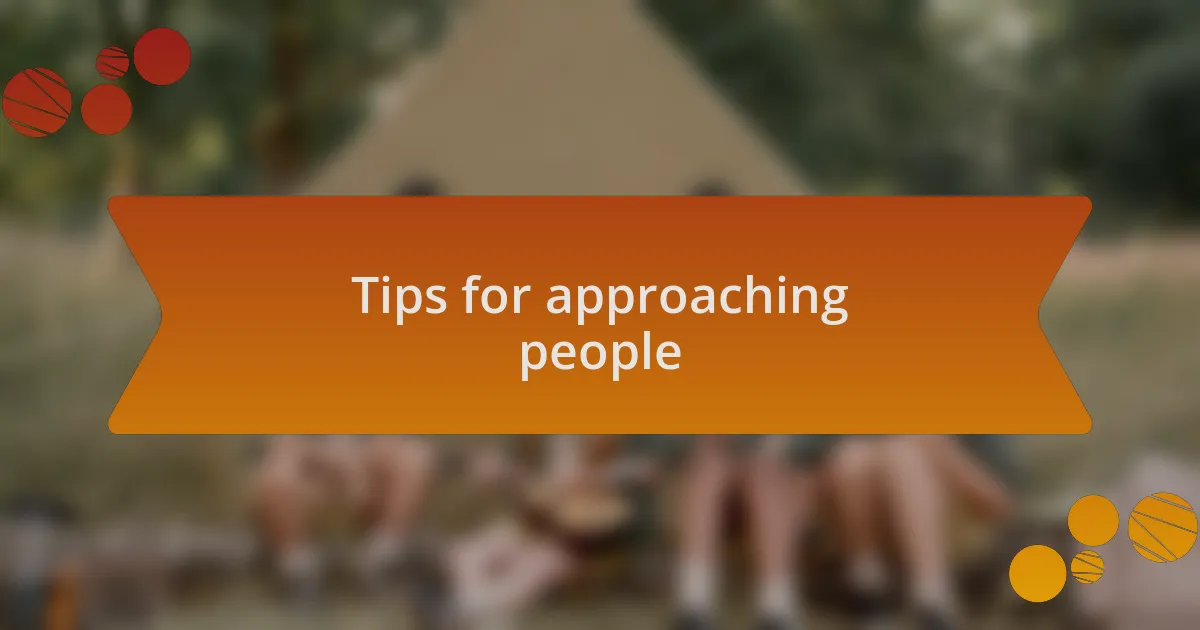
Tips for approaching people
When you approach someone at a music event, confidence is key. I remember feeling a bit nervous the first time I walked up to a well-known artist; my heart raced. But I found that simply introducing myself and expressing genuine interest in their work helped to ease that tension. Have you ever seen how a friendly smile can break the ice and set a positive tone right from the start?
Timing can also make a significant difference when it comes to making connections. For instance, I once approached a sound engineer during a quieter moment in between sets instead of during the hustle of the main act. That choice allowed for a more meaningful conversation where we could really dive into our shared interests. So, consider the environment; there’s a time to blend in and a time to shine.
Listening is just as important as speaking when networking. I learned this during a recording session where my focus was more on hearing others’ ideas than pushing my own. It opened doors to collaborative projects that I never anticipated. Have you thought about how much insight and opportunity can come from truly engaging with someone else’s perspective?
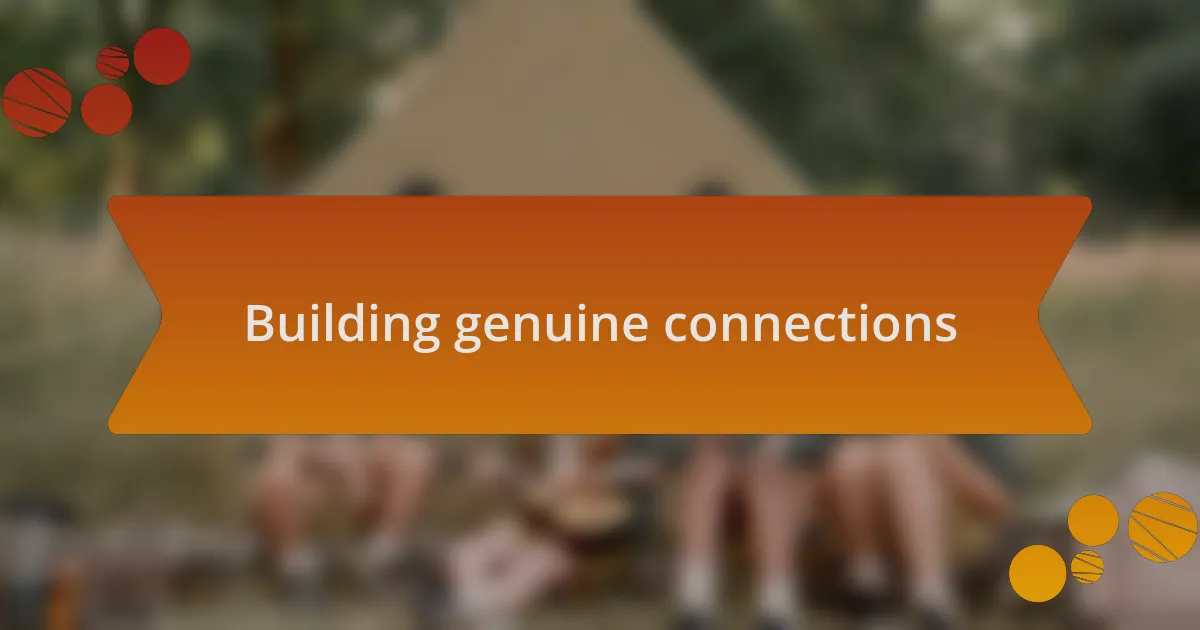
Building genuine connections
Building genuine connections in the music scene requires authenticity and vulnerability. I recall a moment at a festival where, instead of talking about music as a surface-level topic, I shared a personal story about my journey with music and how it transformed my life. The connection that sparked from that honesty was profound; suddenly, we weren’t just two people chatting but sharing our passions and dreams. Have you considered how revealing a bit of your own story can invite others to do the same?
Another key aspect of fostering genuine relationships is investing time in follow-ups. After meeting someone, I often take a moment to connect on social media or send a quick message to express how much I enjoyed our conversation. This simple act makes them feel valued and opens the door for future interactions. Imagine the power of a thoughtful message that shows you genuinely care about what you discussed. Doesn’t it feel exciting to know that these small gestures can transform a fleeting encounter into a lasting connection?
Creating a warm environment is also essential for building meaningful relationships. I remember organizing a small gathering after a local show, inviting both artists and attendees. The relaxed setting encouraged everyone to express themselves freely and share experiences. Have you ever noticed how a casual atmosphere encourages openness? The friendships that formed that night were not just about music; they were built on shared interests and supportive vibes, making those connections feel all the more real.
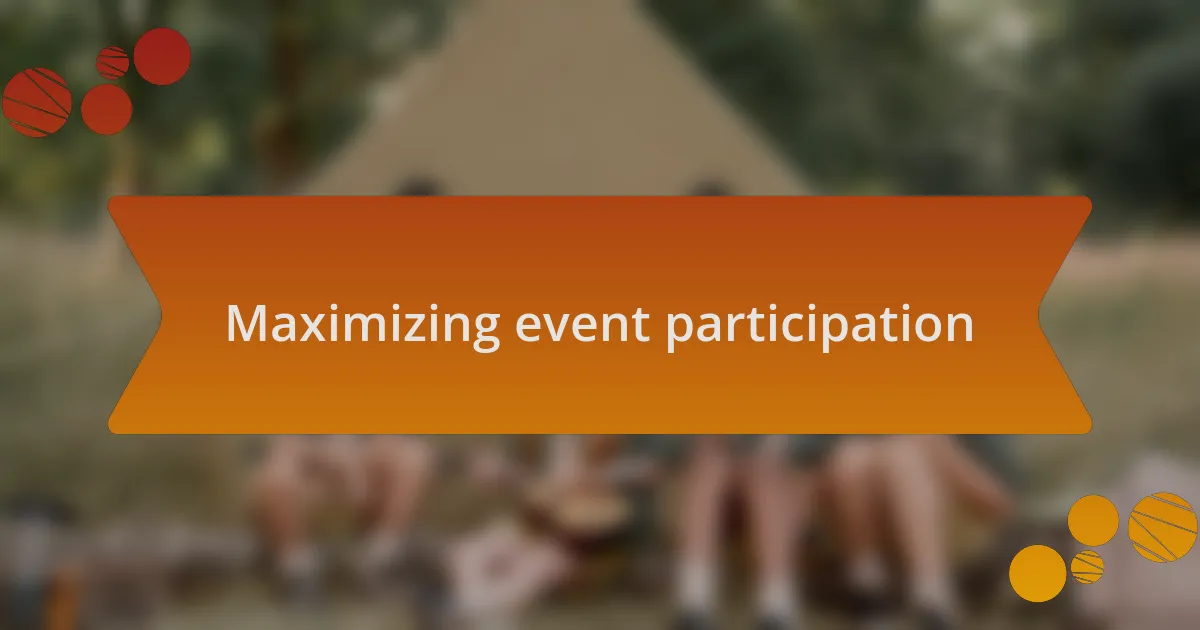
Maximizing event participation
Participation in music events can often hinge on how we engage with our surroundings and each other. I remember attending a showcase where the energy was electric, but what truly made it memorable was my decision to step out of my comfort zone. By volunteering to help with setup, I not only became more involved but also met fellow attendees who shared my passion. Have you ever taken that leap, and found yourself rewarded with new connections just because you chose to participate more actively?
Being proactive in introducing myself has also changed the game for me at music events. At one particular performance, I made it a point to approach an artist I admired. Instead of waiting for the perfect moment, I simply walked up and expressed my appreciation for their work. The moment turned into an engaging conversation, and I ended up with an invitation to connect later on. Can you think of how many opportunities might be missed by hesitation? It’s often in those bold moves that true networking magic happens.
Lastly, utilizing social media as an extension of event participation can amplify our connections. After attending a club show, I took the time to share my experience online, tagging the artists and encouraging others to do the same. This not only sparked discussions but also engaged friends and acquaintances who had experienced similar moments. How can you leverage your online presence to enhance connections made in person? By combining live experiences with digital interactions, I’ve discovered a seamless way to keep conversations alive long after the last note has faded.
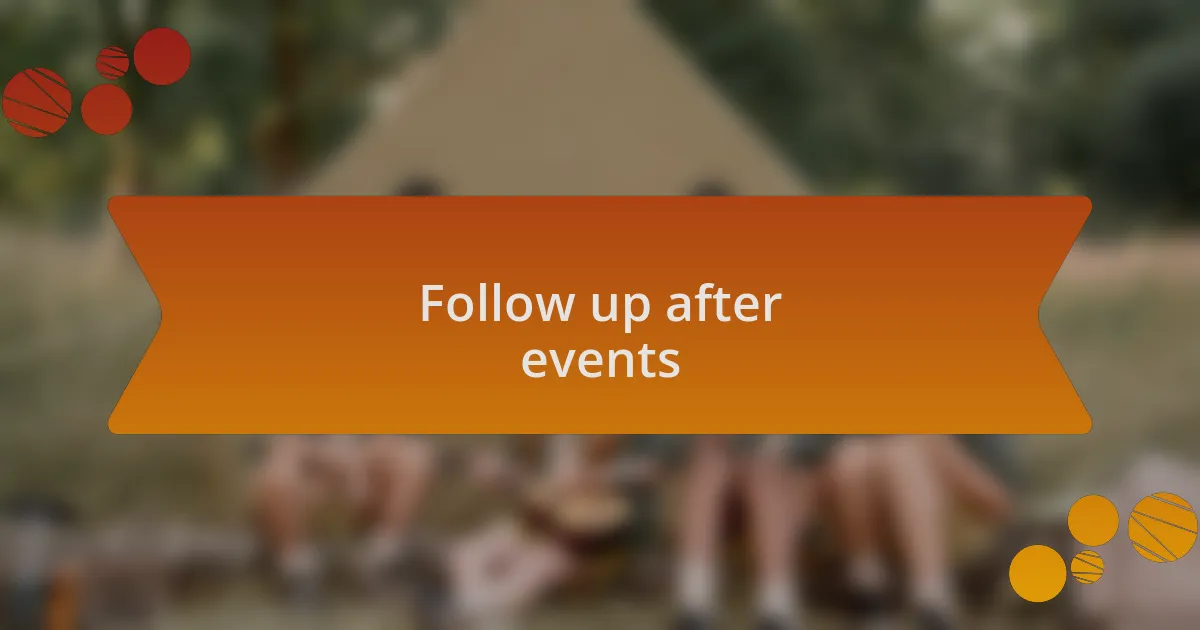
Follow up after events
Following up after music events is just as important as the initial networking itself. I remember once attending an unforgettable showcase where I met several talented artists and fellow music lovers. A few days later, I took the time to reach out to them via email and social media, mentioning something specific from our conversations. It felt rewarding to reconnect and nurture those budding relationships. Have you ever noticed how just a simple message can reignite that initial spark of connection?
Additionally, I find that sharing the experiences I had at these events through posts or messages often brings people together. After one show, I shared a few photos and reflections on why that night resonated with me. Much to my surprise, several connections responded, sparking conversations that led to open invitations for future collaborations. It’s interesting how a little follow-up can lead to unexpected opportunities—what happens when you take that next step?
Lastly, consistent follow-ups have become a routine for me. I’ll often send a quick message to check in or see if they’re attending the next event. This not only keeps the connection fresh but also opens doors for collaboration or camaraderie down the line. Have you ever considered the power of being the one who initiates that conversation? The returns can be far greater than expected.
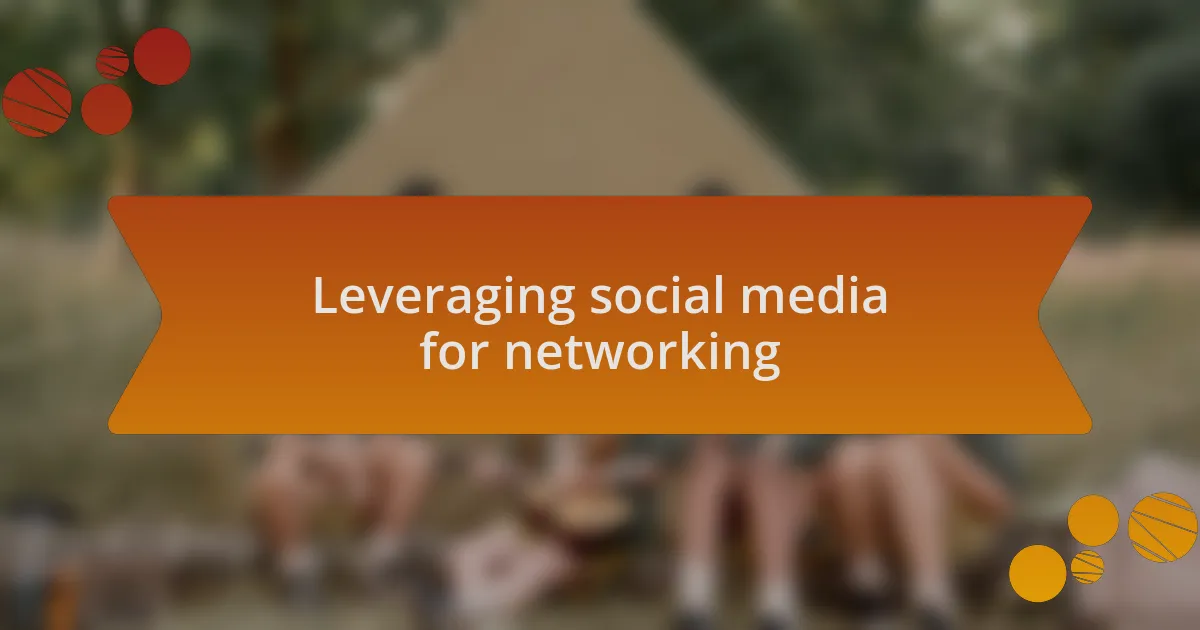
Leveraging social media for networking
Leveraging social media can dramatically enhance your networking efforts at music events. I know from experience that platforms like Instagram and Twitter not only allow you to connect with fellow attendees in real time but also provide a way to showcase and promote the artists you meet. For example, the last time I attended a music festival, I posted a live video of a new band that captivated my attention, tagging both the band and several attendees. The result? A flurry of comments, shares, and new followers who appreciated the discovery, turning a fleeting moment into ongoing connections.
Another invaluable strategy I’ve adopted is creating and engaging with event-specific hashtags. During another concert, I joined discussions through the dedicated hashtag, sharing my thoughts and experiences first-hand. This approach cultivated a sense of community among attendees, leading to conversations and collaborations even after the event was over. Have you ever thought about how adding a simple hashtag could amplify your voice and expand your network in ways you didn’t expect?
Moreover, I often explore the profiles of the individuals I connect with post-event to find common interests and shared experiences. This can facilitate deeper conversations, whether it’s about musical influences or future projects. The last time this happened, I discovered a shared passion for a rare genre of music with someone I met, and that has since blossomed into a creative partnership! Isn’t it fascinating how social media can act as a bridge, transforming acquaintances into collaborators through genuine connection?